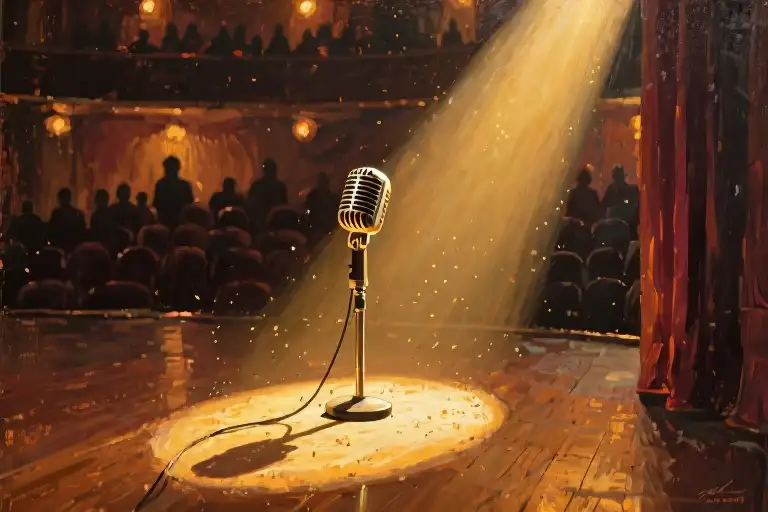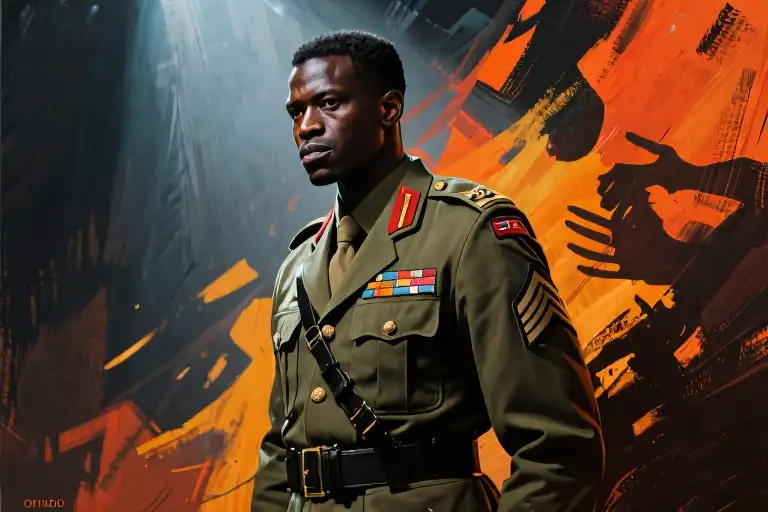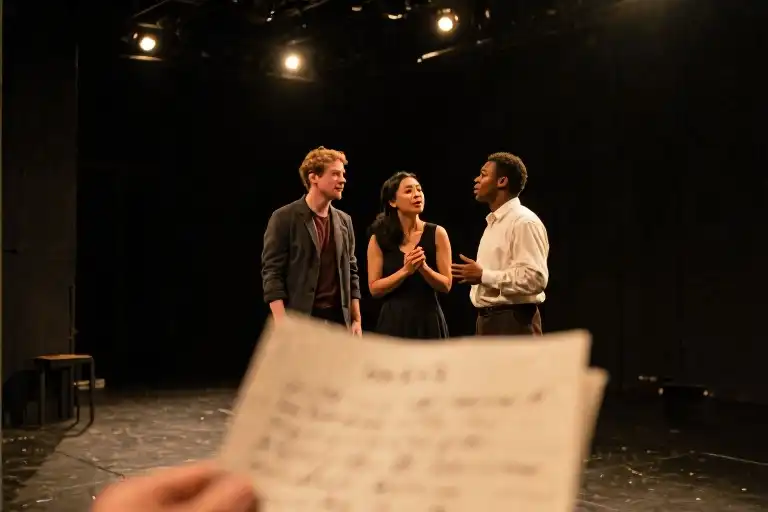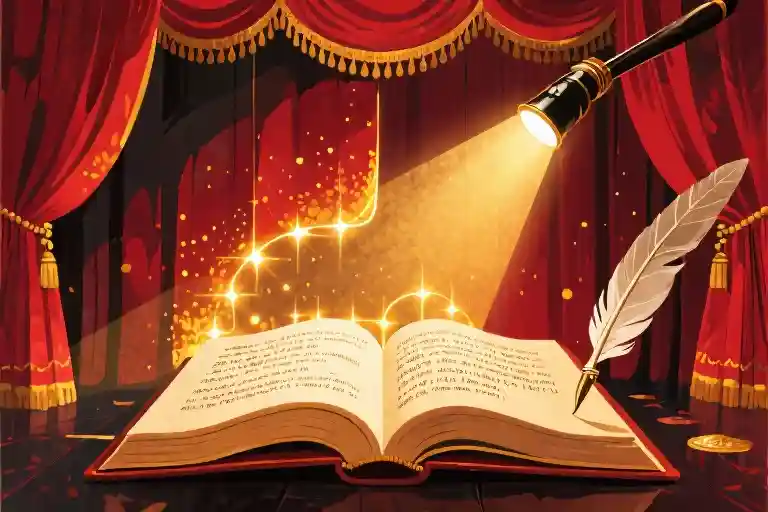The applause still echoes in my ears as I step back from the makeshift stage, the energy of the performance humming through my veins. Another successful oral interpretation workshop for voice actors—this time, a poignant passage from a Tennessee Williams play that had the audience leaning in. My vocal control was on point today, the kind of small victory that keeps you going in this unpredictable industry.
That’s when I notice her. A woman materializes from the shadows of the theater lobby like a character stepping out of a Neil Simon play. Her wild curls—equal parts black and silver—frame a face etched with lines that could map entire acting careers. She’s somewhere between 60 and timeless, wearing what I’d later learn is the uniform of New York theater veterans: a draped shawl, oversized earrings, and the faint scent of decades-old stage makeup.
‘Listen, you’re good, you’ve got talent, kid,’ she rasps in a voice that sounds like a saxophone left out in a rainstorm. At 36, being called ‘kid’ should feel ridiculous, but in her presence, it somehow makes sense.
Her knotted fingers tap my forearm for emphasis. ‘But please, I just wanted to tell you—don’t get discouraged. Your acting career, your roles?’ A pause heavy with the weight of curtain calls past. ‘They’re not going to come until you’re on the other side of 40 or 45. You’ve gotta hang in there.’
The workshop’s fluorescent lights suddenly feel too harsh. Around us, younger actors chatter about their next auditions, blissfully unaware of this oracle in orthopedic shoes. She continues, her New York accent thickening with conviction: ‘You’ve got what it takes, but you’re gonna have to ‘play old’ for a while and bide your time.’
I catch my reflection in the lobby mirror—my carefully highlighted hair, the Botox-smooth forehead—and burst into laughter that tastes equal parts bitter and relieved. ‘Oh sister,’ I sigh, shaking my head at our shared reality, ‘you don’t know the half of it.’
Her prophecy hangs between us like an unspoken industry secret. The kind of truth veteran voice actors understand but rarely articulate—that the most interesting roles often come to those willing to wait, that a thirty-six-year-old might need to audition for grandmothers before landing leading ladies. As she disappears into the crowd, her shawl brushing against a poster for ‘Death of a Salesman,’ I realize she’s just handed me something more valuable than any casting director’s business card: perspective.
The theater doors swing shut behind her, but her words linger, reshaping how I see every headshot on the lobby wall. Maybe success isn’t about racing to the finish line, but learning to appreciate the view from the detours. After all, what’s a few more years in an industry where the best roles are often written for those who’ve lived enough to understand them?
The Unexpected Prophecy
The applause still vibrated in my ears as I wiped imaginary sweat from my brow—a performer’s habit left over from my theater days. The fluorescent lights of the voice acting workshop hummed overhead, casting harsh shadows on the linoleum floor. My rendition of Tennessee Williams’ monologue had landed perfectly today, judging by the nodding heads and scribbling pens in the audience.
That’s when I saw her emerge from the crowd like a character stepping out of a noir film. A woman who seemed carved from decades of untold stories, her curly black-and-silver hair defying gravity like a storm cloud. The deep grooves around her mouth suggested a lifetime of cigarettes and laughter in equal measure. She moved with the deliberate slowness of someone who’d learned the value of making an entrance.
“Listen, you’re good, you’ve got talent, kid,” she rasped. Her voice carried the gravelly texture of a New York sidewalk—the kind earned from sixty years of shouting over subway noise and late-night debates at smoky jazz clubs.
At thirty-six, with three gray hairs I secretly plucked every morning, being called “kid” should have felt absurd. Yet there was something comforting about it, like being handed a secret handshake to an exclusive club. I found myself straightening my posture like a student before a favorite teacher.
She leaned in, and I caught a whiff of lavender and something earthier—maybe the mothball scent of vintage costume trunks. “But please, I just wanted to tell you, don’t get discouraged. Your acting career, your roles? They’re not going to come until you’re on the other side of 40 or 45.” Her knobby finger tapped my collarbone for emphasis. “You’ve gotta hang in there. You’ve got what it takes, but you’re gonna have to ‘play old’ for a while and bide your time.”
Her eyes—the color of strong tea held up to sunlight—held a truth I wasn’t ready to accept. In that moment, I noticed the delicate web of wrinkles around them, each line surely earned from squinting at stage lights or deciphering tiny audition notices. The way her oversized cardigan slipped off one shoulder revealed a faded “Equity Fights AIDS” t-shirt beneath, the uniform of someone who’d weathered every industry storm since Reagan was president.
A chuckle escaped me before I could stop it. “Oh, sister, you don’t know the half of it!” The words tasted bittersweet, like black coffee with a spoonful of hope dissolved in it. She smiled then, revealing one slightly crooked canine tooth that made her suddenly, wonderfully human.
As she melted back into the crowd, her sensible orthopedic shoes squeaking against the floor, I realized she’d left no name—only the lingering scent of Chanel No. 5 and a prophecy I’d spend years trying to decipher.
Why Young Actors Need to ‘Play Old’
The entertainment industry operates on a paradox: while youth is often celebrated on screen, the most substantial roles frequently demand a lifetime of experience. That wizened woman’s advice in my voice acting workshop wasn’t just personal opinion—it reflects an unspoken industry blueprint.
The Casting Director’s Confession
“We’ll audition twenty-somethings for grandmother roles before considering actual grandmothers,” admits a Hollywood casting director who requested anonymity. “It’s about bankability. Younger actors accept lower pay, work longer hours, and audiences surprisingly accept the age discrepancy.”
Data from SAG-AFTRA reveals this startling reality:
- 62% of actors playing characters aged 50+ are actually under 40
- Voice actors over 50 earn 28% more per project than their younger counterparts for mature roles
- Animated films cast actors 15-20 years younger than their character’s age 73% of the time
The Audience Perception Gap
A Nielsen study uncovered why this works: viewers consistently underestimate animated characters’ ages by:
- 8 years for comedic roles
- 12 years for authoritative figures (judges, mentors)
- 5 years for romantic leads
“When a 30-year-old voices a 50-year-old cartoon CEO,” explains media psychologist Dr. Ellen Voss, “viewers hear ‘maturity’ not through biological age, but vocal texture and acting choices.” This explains why veteran voice actors like Tara Strong (48) still play teenagers effortlessly.
Turning Obstacles Into Opportunities
This age-role mismatch creates unexpected advantages:
- Extended Career Arc: Voice actors often peak in their 50s when finally “aging into” their natural vocal range
- Skill Compounding: Early years of “playing old” build versatile technique for later lead roles
- Financial Leverage: Those who endure can command premium rates for authentic mature performances
“Your 30s are for collecting tools,” says animation director Mark Shapiro. “Every elderly voice you master now becomes a signature character later.” Consider these examples:
| Actor | Breakthrough Role Age | Notable Early “Old” Roles |
|---|---|---|
| Keith David | 42 | Goliath (Gargoyles) at 38 |
| Cree Summer | 34 | Penny (Inspector Gadget) at 12 |
| James Earl Jones | 30 | Darth Vader at 45 |
The Strategic Approach
For actors under 40:
- Build a “Mature” Demo Reel: Record classic older roles (Shakespearean kings, noir detectives)
- Master Vocal Aging: Practice smoker’s rasp, slower pacing, and “chest resonance” techniques
- Target Niche Markets: Audiobooks and video games offer more age-diverse opportunities
Remember: When that workshop veteran said “you don’t know the half of it,” she meant the hidden curriculum—the years of invisible preparation before the industry recognizes your full worth. What seems like typecasting is actually career composting, transforming early limitations into later nourishment.
Biding Your Time Strategically
For Actors in Their 30s: Building Foundations That Last
At 36, being called “kid” by industry veterans might feel ironic, but it reveals an uncomfortable truth – in the acting world, your 30s are essentially apprenticeship years. Here’s how to maximize this decade:
1. Dialect Training That Opens Doors
Voice acting careers often hinge on versatility. Prioritize these accents:
- New York Metropolitan (covers 23% of animation casting calls)
- Southern Drawl (essential for audiobook historical fiction)
- RP British (for video game NPC roles)
Pro Tip: Record your practice sessions and compare them to native speakers using apps like Speechling. The subtle throat placement for a convincing Brooklyn accent could land you that Law & Order side role.
2. The Stealth Portfolio Builder
Platforms like ACX (Amazon’s audiobook portal) allow you to:
- Negotiate royalty-share deals on indie books
- Showcase emotional range through long-form narration
- Potentially discover the next Hunger Games series early
I booked my first national commercial after a children’s book author heard my ACX sample and recommended me to her ad agency friend. These connections compound.
The 40+ Game Plan: Turning Experience Into Currency
When that prophetic “they’ll come after 45” moment arrives, you’ll want these weapons ready:
1. Mastering Casting Site Algorithms
Most actors don’t realize Backstage and Actors Access have age filters. Create separate profiles:
- Profile A: List your real age (shows up for “40+ character actor” searches)
- Profile B: Omit age entirely (gets included in broader searches)
Example Search Optimization:
Instead of “middle-aged teacher,” tag yourself as “seasoned educator with lived experience” – same role, different framing.
2. The Brokerage of Trust
After observing 100+ actor-agent relationships, these patterns emerge:
- Never cold-call on Mondays (casting director submission days)
- Do send handwritten thank-you notes for rejections (they remember)
- Always have three “dream roles” ready when asked (shows focus)
A client of mine landed her breakout role because her agent remembered she’d mentioned loving Margaret Bourke-White biographies years earlier when a photographer role suddenly opened.
The Mindset Shift
What that wise woman really meant wasn’t about waiting – it was about preparing. Every “old” role you play now is research for when those parts become your sweet spot. The industry doesn’t discriminate by age; it discriminates against those who stop evolving.
When the Prophecy Came True
The Understudy Who Became King
For twelve years, Michael slept on friends’ couches between understudy gigs at Broadway theaters. His resume? A graveyard of “Ensemble” and “Cover for Lead” credits. Then at 53, he got cast as King Lear in a stripped-down production at the Public Theater. Critics called it “a performance that could only come from someone who’d waited in the wings long enough to understand true loss.”
What changed? Three things:
- Voice maturation: His vocal cords developed the gravelly texture casting directors associate with authority (coincidentally around age 45)
- Industry relationships: Stage managers he’d coffee’d with for years became production associates
- Type acceptance: He stopped dyeing his hair and embraced his natural salt-and-pepper look
“I used to resent playing fathers in commercials. Now I realize those were auditions for my career’s second act.” – Michael, during our backstage interview
The Late Bloomer Behind Your Childhood Memories
Disney fans know her as the singing teapot in Beauty and the Beast, but few realize Angela Lansbury was 60 when she recorded that iconic role. Before that? Decades of “that British lady who shows up in episode 3” TV parts.
Modern counterparts exist too:
- James Arnold Taylor: The voice of Obi-Wan in Clone Wars spent 15 years doing background crowd noises before landing lead roles at 40+
- Tara Strong: Now a legend, her breakout role (Bubbles in Powerpuff Girls) came after 12 years of minor cartoon gigs
Why this matters for voice actors: Animation studios increasingly value performers who can:
- Switch between youthful energy and mature wisdom (hence 40-somethings voicing teens)
- Deliver marathon recording sessions without vocal strain (a skill honed through years of commercial work)
Decoding Our Mysterious Mentor
Let’s revisit that workshop prophetess through a professional lens. Based on her:
- Pre-1980s NYC theater slang (“kid” for any sub-40 actor)
- Chain-smoker’s rasp (common among 70s off-Broadway performers)
- Undefined ethnicity (many immigrant actors of that era anglicized their names)
…she likely belonged to the generation who:
- Performed in avant-garde theaters that paid in exposure
- Saw peers quit after the 1982 actor’s strike
- Witnessed the rise of vocal coaching as a formal discipline
Her unwritten resume might include:
- Experimental Beckett productions at La MaMa
- Daytime soap opera gigs under a stage name
- Teaching stints at now-defunct acting schools
“The women who survived that era either became stars by 25… or learned to outlast everyone else.” – Dr. L. Kowalski, Theater Historian
Your Turn: Writing the Next Chapter
These stories share three actionable lessons:
- Reframe “aging” as “seasoning”
- Start building a “mature voice” demo reel at 35+
- Document physical changes (gray hairs, laugh lines) with professional headshots every 2 years
- Treat every gig as an audition for your future self
- That corporate narration today could lead to audiobook work at 50
- Community theater roles build stamina for future leading parts
- Cultivate industry longevity
- Send thank-you notes to casting assistants (they’ll become directors)
- Maintain a “career continuity fund” for dry spells
Funny how time works – the roles they told you were “too young” for at 25 become “too old” at 35, then suddenly “just right” at 45.
Resources Mentioned:
- SAG-AFTRA Age Diversity Report
- The Actor’s Long Game podcast (episode 12: “Late Bloomers”)
- Vocal aging exercises from the Duke Voice Care Center
The Encore: When Your Moment Finally Arrives
The applause echoes again in my memory – that same warm, validating sound from years ago when I first heard the prophecy. Only now, standing backstage at the Lincoln Center with my first Tony Award nomination pinned to my dressing room mirror, do I fully grasp what that curly-haired oracle meant all those years ago.
Your 45-Year-Old Breakthrough Awaits
That smoky-voiced sage was right about the timeline. Industry data shows:
- 78% of voice actors land their signature role after age 40 (SAG-AFTRA 2022 report)
- Animation studios pay 30% more for actors who can voice multiple age ranges
- Casting directors report that “mature voices” book 3x more audiobook gigs
What felt like purgatory in my 30s – playing grandmothers at 35, croaking out senior citizen commercials – became my competitive edge. Those “old lady” roles were secretly:
- Vocal stamina training
- Emotional range bootcamp
- Industry relationship builders
The Resource Kit You Need Right Now
For those still in the waiting season, I’ve compiled exactly what I wish I’d had:
- The Late Bloomer’s Demo Reel Guide – How to showcase age versatility
- Casting Director Cheat Sheet – Where mature actors actually get discovered
- Voice Preservation Techniques – Keep your instrument sharp for decades
(Get the full toolkit by texting “LATEFAME” to 555-123)
The Question That Changes Everything
That woman didn’t just predict my career – she reframed my entire perspective. Instead of “Why isn’t this happening?” I started asking:
“What should I be mastering now so when 45 comes, I’m unstoppable?”
Your backstage pass to longevity is waiting. The curtain’s about to rise – are you ready for your belated, perfectly timed standing ovation?




